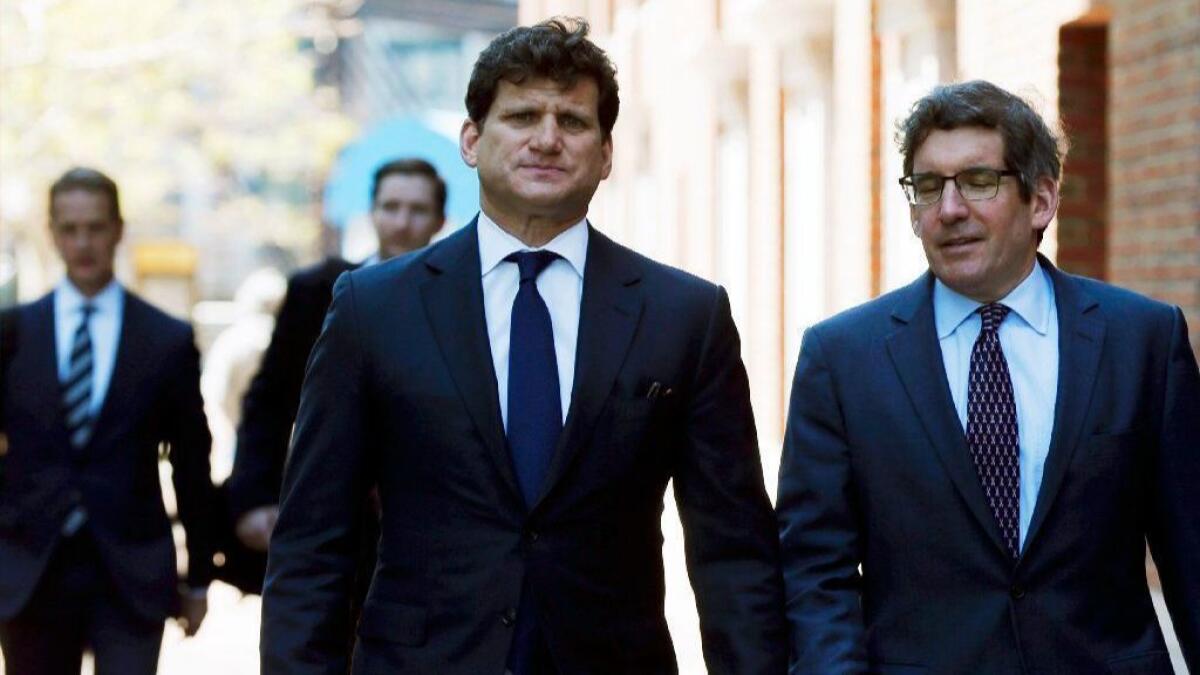Star attorney and Napa Valley vintner plead guilty in college admissions scandal

- Share via
Six months ago, federal agents watched Gordon Caplan and his daughter walk into a West Hollywood school where a 36-year-old man would fix the girl’s college entrance exam. Caplan, the co-chairman of an international law firm, envisioned his daughter attending an elite school — maybe even his alma mater, Cornell University.
On Tuesday, after pleading guilty to fraud conspiracy and admitting he paid $75,000 to rig his daughter’s ACT, Caplan walked out of federal court in Boston and apologized.
“I’m deeply ashamed. I’m terribly sorry. I’m really sorry to my daughter, who I love more than anything in the world,” he told reporters. “She knew nothing about this — hasn’t even applied to college yet. But I’m also sorry to all the other kids who are out there in the admissions process, the college admissions process, and to all the parents that are helping and supporting them.”
Agustin Huneeus Jr., a Napa Valley vintner, pleaded guilty to the same charge Tuesday. He acknowledged paying $100,000 — and agreeing to pay $200,000 more — to both inflate his daughter’s SAT score and ensure she was admitted to USC by passing her off as a top-notch water polo player.

Caplan and Huneeus brought to seven the total number of parents to plead guilty in an investigation that revealed some of the country’s top schools were breached by a fraud perpetrated by Newport Beach college admissions consultant William “Rick” Singer.
Six more parents are scheduled to plead guilty this week.
Both Caplan and Huneeus pleaded guilty to one count of conspiracy to commit mail fraud and honest services mail fraud. Because Huneeus paid more to participate in Singer’s scheme than Caplan, federal prosecutors in Massachusetts have recommended he face a heavier sentence: 15 months in prison and a fine of $95,000.
They recommend Caplan be sentenced at the low end of guidelines that call for eight to 14 months in prison, according to Caplan’s plea agreement and federal sentencing guidelines. They recommend he be fined $40,000.
Caplan will be sentenced Oct. 3; Huneeus will be sentenced Oct. 4.
In pleading guilty to a felony, Caplan, who led Willkie Farr & Gallagher’s private equity practice before his arrest in March, will be disbarred in New York. He has practiced law in the state since 1992 and had no previous disciplinary history, according to state records.
Caplan, 53, was named a “Dealmaker of the Year” by the American Lawyer magazine in 2018 for brokering the $850-million sale of Lord and Taylor’s flagship store in Manhattan.
Willkie Farr has distanced itself from its former co-chairman, saying in April that “nothing is more important to us than our integrity and we do not tolerate behavior that runs contrary to our core values.”
The Greenwich, Conn., resident was the first parent charged in the scandal to break his silence, apologizing on April 5 to the public and to his daughter, whom he said was “devastated to learn what I did and has been hurt the most by it.”
Caplan agreed last summer to pay $75,000 for Singer’s accomplice, an administrator at IMG Academy in Florida, to correct his daughter’s answers on the ACT. Both Singer and the accomplice, Mark Riddell, have pleaded guilty to an array of crimes and are awaiting sentencing.
Caplan went back and forth with Singer about the scheme, clearly uneasy. “Keep in mind, I am a lawyer,” he told Singer in a call recorded by the FBI and included in court documents. “So I’m sort of rules-oriented.”
But he later clarified that he wasn’t “worried about the moral issue here.”
“I’m worried about the, if she’s caught doing that, you know, she’s finished,” he told Singer.
Caplan went through with the scheme. Early on a Saturday morning last December, FBI agents watched Caplan arrive with his daughter at a school in West Hollywood where Singer had allegedly bribed an administrator to turn a blind eye to the cheating.
That administrator, Igor Dvorskiy, was indicted on a racketeering conspiracy charge. He has pleaded not guilty.
In exchange for the test-rigging service, Caplan wired $75,000 in two installments to a bank account he believed was affiliated with Singer’s foundation. He was unaware that Singer had been apprehended, that the consultant was cooperating with investigators in hopes of receiving a lighter sentence, and that the bank account was controlled not by Singer or his foundation but by the FBI.
Caplan said in April that his daughter, who is still in high school, had no knowledge of his misdeeds. He said he was dedicating himself to winning back the trust and respect of his daughter, family and community.
“The remorse and shame that I feel is more than I can convey,” he said.
Huneeus, 53, said Tuesday he took full responsibility for his crimes, which brought shame onto himself, his family and his colleagues.
“While I wish I could go back and make different and better choices, of course I cannot,” he said in a statement. “What I can do now is to say: I am sorry and I apologize.”
Huneeus’ daughter was among three children of Singer’s clients who received letters from prosecutors naming them as possible targets of the investigation.
Huneeus paid Singer $50,000 for a score of 1380 out of 1600 on the SAT. Though the score ranked in the 96th percentile nationally, it wasn’t good enough for Huneeus, who groused to Singer on a wire-tapped call that “if you had wanted to, I mean, [my daughter’s] score could have been 1550, right?”
“No,” Singer told him. “’Cause I would have got investigated for sure based on her grades.”
The vintner agreed to pay Singer another $250,000 to make sure she was admitted to USC as a recruited water polo player, prosecutors say.
Singer submitted a recruiting profile to USC that included made-up honors and a picture of another girl playing water polo, because Huneeus’ daughter had not sent Singer a photograph to alter in Photoshop in time.
Huneeus worried aloud to Singer about “this thing blow[ing] up in my face.” What if, he asked, some news article revealed that USC’s water polo team was “selling seats into the school for 250 grand?”
“Oh no,” Singer assured him. “Well, no, because she’s a water polo player.”
“But she’s not,” Huneeus responded. “I mean that’s what I mean.”
Huneeus’ daughter was conditionally approved by a USC admissions committee in November 2018 after Donna Heinel, an administrator in the athletics department, presented her as a water polo recruit, according to charging documents filed in Huneeus’ case.
Huneeus mailed Heinel a check for $50,000 later that month “with the memo line referencing his daughter,” according to an affidavit supporting charges against the vintner.
Heinel was fired by USC on March 12, the same day prosecutors unsealed an indictment charging her with racketeering conspiracy. She has pleaded not guilty.
Jovan Vavic, USC’s water polo coach, was also fired March 12. He, too, has been indicted on a racketeering conspiracy charge. He has pleaded not guilty.
In a wiretapped call, Singer told Huneeus he subsidized the salaries of Vavic’s coaching staff at USC.
“I put two of his staff members on my books as contractors,” Singer told Huneeus, according to the affidavit in his case. “And then I pay them throughout the year.”
More to Read
Sign up for Essential California
The most important California stories and recommendations in your inbox every morning.
You may occasionally receive promotional content from the Los Angeles Times.










